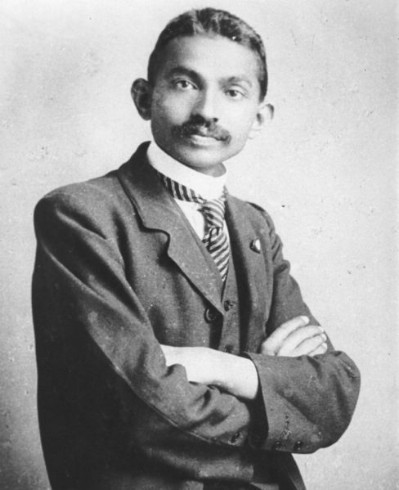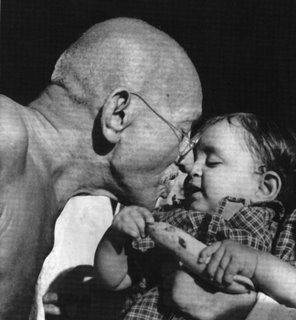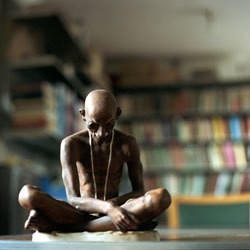 |
| Gandhi earlier in life. (http://100mim.wordpress.com/2011/03/29/como-gandhi-se-tornou-gandhi/) |
Mohandas Karamchand Gandhi was, and is, one of the most influential and inspirational humans ever to walk this earth. He lived from 1869, to 1948. Growing up, his mother was a very religious Hindu, and taught him the ways of peace, love, and tolerance of diversity. He lived modestly, strove to practice non-violence and truth in all situations, and advocated that others do the same. He fought for civil rights and liberation of Indian people, poverty, and drawing religious and ethnic amity into society. Although Gandhi had endured many hardships throughout his life, which could discourage more than a few, he fought for hundreds of thousands of other peoples’ rights and did so not only peacefully, but selflessly and victoriously.
Gandhi started out his civil rights career at age 19, studying law in London, England. He dressed like an Englishman, and was fostered by the British to ‘think like the British’. When he returned to India, he got involved in the Bombay High Court, which lead to him being transported down to South Africa to act as a legal adviser in Durban, for 20 years. It didn’t take long for him to see that something was not right in South Africa. Many Indian workers had been brought down to labour on sugar estates, and Gandhi was appalled at the racist nature in which the Indian community had been treated. He chose to take action and began campaigning for not only Indian rights, but for the civil rights of all of the miss-treated “coloureds” as well.
 |
| Gandhi was very loving. (http://100mim.wordpress.com/2011/03/29/como-gandhi-se-tornou-gandhi/) |
Gandhi had developed a philosophy of struggle for political and human rights through non-violence, while in South Africa. He had started spreading his philosophy amongst fellow Indians, to help achieve political rights. At that period the leader of Indian National Congress was Lokmanya Tilak who was in support of intrusive and violent actions against the British. Gandhi disagreed with this idea, yet admired the other ideas of Tilak. For instance they both agreed that Indian political struggle was a matter of the people and not only of the intellectuals, and both supported a dramatic cultural and social change in Indian society. In 1920 Tilak died and left Gandhi to become the leader of Indian National Congress.
After returning from South Africa (where he was discriminated against because of his Indian origin) Gandhi changed his dressing style and began to dress like a simple Indian farmer. His philosophy was that all are equal and everyone can be successful if they have the opportunity. He built an ashram in which everyone did all different jobs. He even cleaned the toilet, which according to strict Indian customs, was the job of “the lower castes and untouchables”, but he did not care. Because of his revolutionary ideas, many of the then elitist Indian society mocked his philosophy. Even they would later come to admire and follow this way of life.
 |
| Meditating Gandhi statue, in Britain. (http://www.culture24.org.uk/am33843) |
Gandhi’s ways seemed to be catching on a bit, but even then he had many struggles to overcome. He had become the leader of the Indian National Congress in 1920, yet he did not always lead the Indian nationalist movement. There were periods when he was arrested and was completely isolated from the movement. Even when he was the leader of Indian National Congress there were members in the Congress who did not accept his ideas. Sometimes he had separated from the nationalist movement for other causes. In the early 1930s Gandhi resigned from the leadership of the Congress because of growing criticism against him. But from then on Gandhi became the father figure of the Congress. Outside the Congress, however, Mahatma had many rivals who defied his political philosophy. Mainly Hindu nationalists. They saw in Mahatma Gandhi, a pro-Muslim trend. During India's independence there were many riots between Hindus and Muslims, in which, Gandhi tried to be a middleman between them. Many Hindus did not like his stand and saw him as a traitor. There were many conflicts and riots, including the “Quit India Movement”; a disobedience movement launched in response to Gandhi's call for “immediate Independence”. He intended to leave India and end his life in Pakistan, but on January 30th, 1948 Nathuram Godse, a Hindu nationalist, shot him to death.
Mohandas Gandhi is now known world-wide because of the Swaraj, (Independence of India from a foreign country’s control) he was responsible for, and his peaceful, wise, and strong personality. He now has an Indian holiday in his honour of his birthday on October 2nd, and is referred to by many endearing names, such as “Mahatma” or great soul, and “Bapu” or father. He believed in helping people, and living modestly, and peacefully. He helped win back India’s Independence, and fought for countless people’s right to respect, success, and equality that they deserved. He left a large impact on the world, and is still alive today, in spirit. In conclusion, Mohandas K. Gandhi was an amazing role model, hero, and civil activist. He dealt with problems in a revolutionary way, which is why Mohandas Gandhi is my hero.
Page created on 10/27/2011 12:00:00 AM
Last edited 10/27/2011 12:00:00 AM
